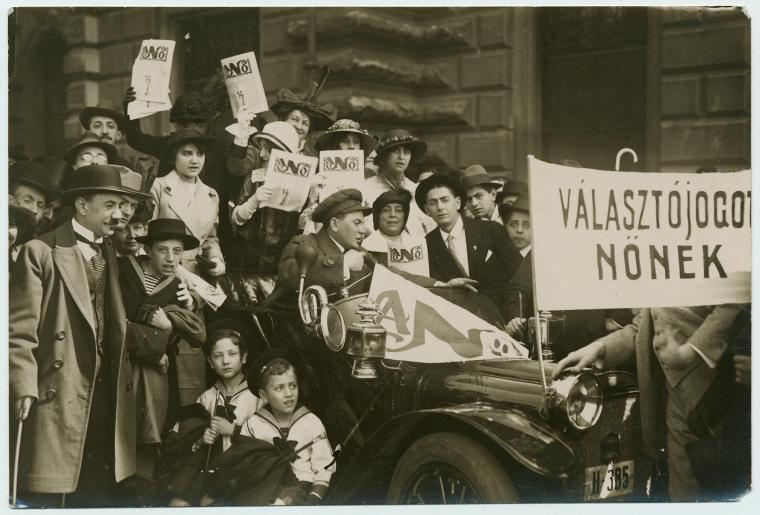Survival Strategies, Adaptation, International Embeddedness
Research Possibilities Related to the Interwar History of the Feminists Association
DOI:
https://doi.org/10.15170/PAAA.2020.07.02.06%20Keywords:
women's history, Association of Feminists, New York, Horthy Era, Vilma Glücklich, Rózsa Schwimmer, Oszkárné SzirmayAbstract
Downloads
References
Anderson, Harriet: Vision und Leidenschaft. Die Frauenbewegung im Fin de Siècle Wiens. Wien, 1994.
Czeferner Dóra: A New York-i Schwimmer Rózsa-hagyaték jelentősége. Levéltári Közlemények 89. (2018):1. 157–169.
Czeferner Dóra: Polgári-liberális, feminista nőszervezetek az Osztrák–Magyar Monarchiában 1907–1918. Egyesületek, Periodikák, Tartalomelemzés. Doktori értekezés. Kézirat. Pécs, 2020.
Glant, Tibor: Against All Odds: Vira B. Whitehouse and Rosika Schwimmer in Switzerland, 1918. American Studies International 40. (2002):1. 34–51.
Hofmann-Weinberger, Helga: Frauenstimmrechtskomitee (Bund Österreichischer Frauenvereine). Ariadne – das frauen- und genderspezifische Wissensportal: Frauen in Bewegung 1848–1938(https://fraueninbewegung.onb.ac.at/node/616) [2019.10.30.]
Kereszty Orsolya: „A Nő és a Társadalom” a nők művelődéséért (1907–1913). Budapest, 2011.
Litván György: Károlyi Mihály levelezése I. 1905–1920. Budapest, 1978.
McFadden, Margaret: A Radical Exchange: Rosika Schwimmer, Emma Goldman, Hella Wuolijoki and Red-White Struggles for Women. In: Women’s Movements: Networks and Debates in Post-Communist Countries in the 19th and 20th Centuries. Ed. Saurer, Edith. Köln – Wien, 2006. 494–504.
Nyáry Krisztián: Merész magyarok. 30 emberi történet. Budapest, 2015.
Paletschek, Sylvia – Pietrow-Ennker, Bianca: Women’s Emancipation Movements in Europe in the Long Nineteenth Century: Conclusions. In: Women’s Emancipation Movements in the Nineteenth Century. A European Perspective. Eds. Paletschek, Sylvia – Pietrow-Ennker, Bianca. Stanford, 2004. 301–331. ǁ [DOI] https://doi.org/10.1515/9780804767071-018
Papp, Claudia: „Die Kraft der weiblichen Seele”. Feminismus in Ungarn, 1918–1941. Münster, 2004.
Papp, Claudia – Zimmermann, Susan: Meller, Mrs Artur, Eugénia Miskolczy. In: A Biographical Dictionary of Women’s Movements and Feminsm. Central, Eastern, and South Eastern European, 19th and 20th Centuries. Eds. Haan, Francisca de – Daskalova, Krassimira – Loutfi, Anna. Budapest – New York, 2006. 331–335. ǁ [DOI] https://doi.org/10.1515/9786155053726-084
Papp Barbara – Sipos Balázs: Modern, diplomás nő a Horthy-korszakban. Budapest, 2017.
Pastor, Peter: The Diplomatic Fiasco of the Modern World’s First Woman Ambassador, Rosa Bedy-Schwimmer. East European Quarterly 9. (1975):3. 273–282.
Pető, Andrea: Kontinuität und Wandel in der ungarischen Frauenbewegung der Zwischenkriegsperiode. In: Feminismus und Demokratie. Europäische Frauenbewegung der 1920-er Jahre.Hrsg. Gerhard, Ute. Königstein, 2001. 138–158.
Pető, Andrea: The History of Hungarian Women’s Movement. In: Thinking Differently. A Reader in European Women’s Studies.Eds. Griffin, Gabriele – Braidotti, Rosi. London – New York, 2002. 361–371.
Pető Andrea: Egy elmeséletlen történet a Feministák Egyesületéről. In: Feminista almanach. Szerk. Török Mónika. Budapest, 2005. 210–220.
Pető, Andrea – Szapor, Judit: The State of Women’s and Gender History in Eastern Europe: the Case of Hungary. Journal of Women’s History 19. (2007):1. 160–166. ǁ [DOI] https://doi.org/10.1353/jowh.2007.0022 ǁ [WoS] https://www.webofscience.com/wos/woscc/full-record/WOS:000244668600015
Relph, Anne Kimbell: The World Center for Women’s Archives, 1935–1940. Signs 4. (1979):3. 597–603. ǁ [DOI] https://doi.org/10.1086/493651
Sipos Balázs: Összegabalyodott nőtörténet. Nemzeti és transznacionális nőtípusok találkozása az első világháború utáni Magyarországon. In: Homoklapátolás nemesércért. A 70 éves Standeisky Éva tiszteletére. Szerk. Balázs Eszter – Koltai Gábor – Takács Róbert. Budapest, 2018. 192–202.
Szapor, Judith: Sisters of Foes: The Shifting Front Lines of the Hungarian Women’s Movement. In: Women’s Emancipation Movements in the Nineteenth Century. A European Perspective. Eds. Paletschek, Sylvia – Pietrow-Ennker, Bianca. Stanford, 2004. 189–205. ǁ [DOI] https://doi.org/10.1515/9780804767071-012
Szapor, Judith: Who Represents Hungarian Women? The Demise of the Liberal Bourgeois Women’s Rights Movement and the Rise of the Rightwing Women’s Movement in the Aftermath of World War I. In: Aftermaths of War: Women’s Movements and Female Activists, 1918–1923. Eds. Sharp, Ingrid – Stibbe, Matthew. Leiden, 2011. 245–267. ǁ [DOI] https://doi.org/10.1163/ej.9789004191723.i-432.71
Szapor, Judith: The Women’s Debating Club of Countess Károlyi; Hungarian Women’s Revolutionary and Counter-Revolutionary Activism in 1918/19. L’Homme 25. (2014):2. 63–70. ǁ [DOI] https://doi.org/10.7788/figurationen-2014-0206
Szapor, Judith: ’Good Hungarian Women’ vs. ‘Radicals, Feminists, and Jewish Intellectuals’: Rosika Schwimmer and the Hungarian Women’s Debating Club in 1918–1919. Women’s History Review, Agency, Activism and Organization, Special Issue26. (2017):6. 1–19. ǁ [DOI] https://doi.org/10.1080/09612025.2017.1346870
Szapor, Judith – Gottlieb, Julie – Lintunen, Tina – Wernitznig, Dagmar: Suffrage and Nationalism in Comparative Perspective: Britain, Hungary, Finland and the Transnational Experience of Rosika Schwimmer. In: Women activists between War and Peace. Europe, 1918–1923. Eds. Sharp, Ingrid – Stibbe, Matthew. London, 2017. 29–76. ǁ [DOI] https://doi.org/10.5040/9781474205894.0009 ǁ [WoS] https://www.webofscience.com/wos/woscc/full-record/WOS:000452986100002
Szapor, Judith: Hungarian Women’s Activism in the Wake of the First World War. From Rights to Revanche. London, 2018. ǁ [WoS] https://www.webofscience.com/wos/woscc/full-record/WOS:000635757700009
Nagyné Szegvári Katalin: Út a női egyenjogúsághoz. Budapest, 1981.
Wernitznig, Dagmar: „It is a strange thing not to belong to any country, as is my case now.” Fascism, Refugees, Statelessness, and Rosika Schwimmer (1877–1948). DEP: Deportate, Esuli, Profughe 27. (2015):1. 102–108. (https://www.unive.it/pag/fi-leadmin/user_upload/dipartimenti/DSLCC/documenti/DEP/numeri/n27/05_Ric_5-Dagmar.pdf) [2020.09.01.] ǁ [DOI] https://doi.org/10.1080/09612025.2016.1181338
Wernitznig, Dagmar: Out of her Time? Rosika Schwimmer’s Transnational Activism after the First World War. Women’s History Review 26. (2017):2. 262–279. ǁ [DOI] https://doi.org/10.1080/09612025.2016.1181338 ǁ [WoS] https://www.webofscience.com/wos/woscc/full-record/WOS:000393871600007
Bader-Zaar, Brigitta: „Weise Mäßigung” und „ungetrübter Blick”. Die bürgerlich-liberale Frauenbewegung im Streben nach politischer Gleichberechtigung. In: Bürgerliche Frauenkultur im 19. Jahrhundert. Hrsg. Mazohl-Wallnig, Brigitte. Wien, 1995. 233–268.
Zimmermann, Susan: Die bessere Hälfte? Frauenbewegungen und Frauenbestrebungen in Ungarn der Habsburgermonarchie 1848 bis 1918. Wien, 1999.
Zimmermann, Susan: Jenseits von Ost und West. Entwicklungswege zentral-osteuropäischer Frauenbewegungen im transnationalen Kontext. In: Brüche, Geschlecht, Gesellschaft. Gender Studies zwischen Ost und West. Bundesministerium für Bildung, Wissenschaft und Kultur. Hrsg. Pechriggl, Alice – Bidwell-Steiner, Marlen. Wien, 2003. 119–147.
Zimmermann, Susan: The Challenge of Multinational Empire for the International Women’s Movement. The Habsburg Monarchy and the Development of Feminist Inter/National Politics. Journal of Women’s History 17. (2005):2. 87–117. ǁ [DOI] https://doi.org/10.1353/jowh.2005.0026

Downloads
Published
How to Cite
Issue
Section
License

This work is licensed under a Creative Commons Attribution-NonCommercial-NoDerivatives 4.0 International License.










